- Home
- China Miéville
Looking for Jake: Stories Page 2
Looking for Jake: Stories Read online
Page 2
The shop was dark but the door opened. It was a relief to walk into still air.
We’re fucking shut, somebody said. He sounded despairing.
I wound between the piles of strong-smelling books towards the till. I could see shapes and shades in this halfhearted darkness. An old bald man was slumped on a stool behind the desk.
I don’t want to buy anything, I said. I’m looking for someone. I described you.
Look around, mate, he said. Fucking empty. What do you want from me? I ain’t seen your friend or no one.
Very fast, I felt hysteria. I swallowed back a desire to run to all the corners of the shop and throw piles of books around, shouting your name, to see where you were hiding. As I fought to speak the old man took some kind of contemptuous pity on me and sighed.
One like the one you said, he’s been drifting in and out of here all day. Last here about two hours ago. If he comes in again he can fuck off, I’m closed.
How do you tell the incredible? It seems odd, what strikes us as unbelievable.
I had learnt, very fast, that the rules of the city had imploded, that sense had broken down, that London was a broken and bloodied thing. I accepted that with numbness, only a very little astonished. But I was nearly sick with disbelief and relief to walk out of that shop and see you waiting.
You stood under the eaves of a newsagent’s, half in shadow, an unmistakable silhouette.
If I stop for a moment it is all so prosaic, so obvious, that you would wait for me there. When I saw you, though, it was like a miracle.
Did you shudder with relief to see me?
Could you believe your eyes?
It’s difficult to remember that, right now, when I am up here on the roof surrounded by the hungry flapping things that I cannot see, without you.
We met in the darkness that dripped off the front of the building’s facade. I hugged you tight.
Man . . . I said.
Hey, you said.
We stood like fools, silent for a while.
Do you understand what’s happened? I said.
You shook your head, shrugged and waved your arms vaguely to encompass everything around us.
I don’t want to go home, you said. I felt it go. I was in the shop and I was looking at this weird little book and I felt something huge just . . . slip away.
I was asleep in a train. I woke up and found it like this.
What happens now?
I thought you could tell me that. Didn’t you all get issued . . . rule books or something? I thought I was punished for being asleep, that’s why I didn’t understand anything.
No, man. You know, loads of people have just . . . disappeared, I swear. When I was in the shop I looked up just before, and there were four other people in there. And then I looked up just after and there was only me and this other guy, and the shopkeeper.
Smiles, I said. The cheerful one.
Yeah.
We stood silent again.
This is the way the world ends, you said.
Not with a bang, I continued, but with a . . .
We thought.
. . . with a long-drawn-out breath? you suggested.
I told you that I was walking home, to Kilburn, just over the way. Come with me, I said. Stay at mine.
You were hesitant.
Stupid, stupid, stupid, I’m sure it was my fault. It was just the old argument, about you not coming to see me enough, not staying longer, translated into the world’s new language. Before the fall you would have made despairing noises about having to be somewhere, hint darkly at commitments you could not explain, and disappear. But in this new time those excuses became absurd. And the energy you put into your evasions was channelled elsewhere, into the city, which was hungry like a newborn thing, which sucked up your anxiety, assimilated your inchoate desires and fulfilled them.
At least walk with me over to Kilburn, I said. We can work out what we’re going to do when we’re there.
Yeah, sure man, I just want to . . .
I couldn’t make out what it was you wanted to do.
You were distracted, you kept looking over my shoulder at something, and I was looking around quickly, to see what was intriguing you. There was a sense of interruptions, though the night was as silent as ever, and I kept glancing back at you, and I tugged at you to make you come with me and you said Sure sure man, just one second, I want to see something and you began to cross the road with your eyes fixed on something out of my sight and I was getting angry and then I lost my grip on you because I could hear a sound from over the brow of the railway bridge, from the east. I could hear the sound of hooves.
My arm was still outstretched but I was no longer touching you, and I turned my head towards the sound, I stared at the hill’s apex. Time stretched out. The darkness just above the pavement was split by a wicked splinter that grew and grew as something long and thin and sharp appeared over the hill. It sliced the night at an acute angle. A clenched, gloved fist rose below it, clutching it tight. It was a sword, a splendid ceremonial sabre. The sword pulled a man after it, a man in a strange helmet, a long silver spike adorning his head and a white plume streaming out in his wake.
He rode in an insane gallop but I felt no urgency as he burst into view, and I had all the time I needed to see him, to study his clothes, his weapon, his face, to recognise him.
He was one of the horsemen who stands outside the palace . . . Are they called the household cavalry? With the hair draped from their helmet spike in an immaculate cone, their mirrored boots, their bored horses. They are legendary for their immobility. It is a tourist game to stare at them and mock them and stroke their mounts’ noses, while no flicker of human emotion defiles their duty.
As this man’s head broke the brow of the hill I saw that his face was creased and cracked into an astonishing warrior’s expression, the snarl of an attacking dog, idiot bravery such as must have been painted across the faces of the Light Brigade.
His red jacket was unbuttoned and it flickered around him like a flame. He half stood in his stirrups, crouched low, grasping the reins in his left hand, his right held high with that beautiful blade spitting light into my face. His horse rose into view, its veins huge under its white skin, its eyes rolling in an insane equine leer, drool spurting from behind its bared teeth, its hooves hammering down the deserted tarmac of the Willesden railway bridge.
The soldier was silent, though his mouth was open as if he shouted his valedictory roar. He rode on, holding his sword high, bearing down on some imaginary enemy, pushing his horse on towards Dollis Hill, down past the Japanese restaurant and the record shop and the bike dealer and the vacuum-cleaner repair man.
The soldier swept past me, stunning and stupid and misplaced. He rode between us, Jake, so close that beads of sweat hit me.
I can picture him on duty as the cataclysm fell, sensing the change in the order of things and knowing that the queen he was sworn to protect was gone or irrelevant, that his pomp meant nothing in the decaying city, that he had been trained into absurdity and uselessness, and deciding that he would be a soldier, just once. I see him clicking his heels and cantering through the confused streets of central London, picking up speed as the anger at his redundancy grows, giving the horse its head, letting it run, feeling it shy at the strange new residents of the skies, until it was galloping hard and he draws his weapon to prove that he can fight, and careers off into the flatlands of northwest London, to disappear or die.
I watched his passing, dumbstruck and in awe.
And when I turned back, of course, Jake, when I turned back, you had gone.
The frantic searches, the shouts and the misery you can imagine for yourself. I have little enough dignity as it is. It went on for a long time, though I had known as I raised my head to your lack that I would not find you.
Eventually I found my way to Kilburn, and as I walked past the Gaumont State I looked up and saw that neon message, garish and banal and terrifying. The message that
is there still, the request that tonight, finally, after so many months, I think I will acquiesce to.
I don’t know where you went, how you were disappeared. I don’t know how I lost you. But after all my searching for a hiding place, that message on the face of the Gaumont cannot be coincidence. Although it might, of course, be misleading. It might be a game. It might be a trap.
But I’m sick of waiting, you know? I’m sick of wondering. So let me tell you what I’m going to do. I’m going to finish this letter, soon now, and I’m going to put it in an envelope with your name on it. I’ll put a stamp on it (it can’t hurt), and I’ll venture out into the street—yes, even in the heart of the night—and I’ll put it in the post box.
From there, I don’t know what’ll happen. I don’t know the rules of this place at all. It might be eaten by some presence inside the box, it might be spat back out at me, or reproduced a hundred times and pasted on the windows of all the warehouses in London. I’m hoping that it will find its way to you. Maybe it’ll appear in your pocket, or at the door of your place, wherever you are now. If you are anywhere, that is.
It’s a forlorn hope. I admit that. Of course I admit that.
But I had you, and I lost you again. I’m marking your passing. And I am marking mine.
Because you see, Jake, then I’m going to walk the short distance up Kilburn High Road to the Gaumont State, and I’m going to read its plea, its command, and this time I think I will obey.
The Gaumont State is a beacon, a lighthouse, a warning we missed. It jags impassive into the clouds as the city founders on rocks. Its filthy cream walls are daubed with a hundred markings; human, animal, meteorological, and other. In its squat square tower lies the huge nest of rags or bones or hair where the flying things bicker and brood. The Gaumont State exerts its own gravity over the changed city. I suspect all compasses point to it now. I suspect that in the magnificent entrance, framed by those wide stairs, something is waiting. The Gaumont State is the generator of the dirty entropy that has taken London. I suspect there are many fascinating things inside.
I’m going to let it reel me in.
Those two huge pinkish-red signs that heralded the Gaumont’s rebirth as a temple of cheap games—they have changed. They are selective. They ignore certain letters, and have done ever since that night. Both now scorn the initial B. The sign on the left illuminates only the second and third letters, that on the right only the fourth and fifth. The signs flicker on and off in antiphase, taking turns to blaze their gaudy challenge.
IN . . .
GO . . .
IN.
GO IN.
GO IN.
Go in.
Alright. OK. I’ll go in. I’ll tidy up my house and post my letter and stand in front of that edifice, squinting at the now-opaque glass that keeps its secrets, and I will go in.
I don’t really believe you’re in there, Jake, if you’re reading this. I don’t really believe that any longer. I know that can’t be so. But I can’t leave it alone. I can leave no stone unturned.
I’m so fucking lonely.
I’ll climb those exquisite stairs, if I get that far. I’ll cross the grand corridors, wind through tunnels into the great vast hall that I believe will be glowing very bright. If I get that far.
Could be that I’ll find you. I’ll find something, something will find me.
I won’t be coming home, I’m sure.
I’ll go in. The city doesn’t need me around while it winds down. I was going to catalogue its secrets, but that was for my benefit, not the city’s, and this is just as good.
I’ll go in.
See you soon, I hope, Jake. I hope.
All my love,
FOUNDATION
You watch the man who comes and speaks to buildings. He circles the houses, looking up from the sidewalks, from the concrete gardens, looking down at the supports that go into the earth. He enters every room, taps windows and wiggles ill-fitted panes, he prods at plaster, hauls into attics. In the basements he listens to supports, and all the time he whispers.
The buildings whisper back, he says. He works in brownstones, in tenements, banks and warehouses across the city. They tell him where their faultlines run. When he’s done he tells you why the crack is spreading, why the wall is damp, where erosion is, what the cost will be to fix it or to let it rot. He is never wrong.
Is he a surveyor? A structural engineer? He has no framed certificates but a thick portfolio of references, a ten-year reputation. There are cuttings about him from across America. They have called him the house-whisperer. He has been a phenomenon for years.
When he speaks he wears a large and firm smile. He has to push his words past it so they come out misshapen and terse. He fights not to raise his voice over the sounds he knows you cannot hear.
“Yeah no problem but that supporting wall’s powdering,” he says. If you watch him close you will see that he peeps quickly at the earth, again and again, at the building’s sunken base. When he goes below, into the cellar, he is nervy. He talks more quickly. The building speaks loudest to him down there, and when he comes up again he is sweating below his smile.
When he drives he looks to either side of the road with tremendous and unending shock, taking in all the foundations. Past building sites he stares at the earthmovers. He watches their trundling motion as if they are some carnivore.
Every night he dreams he is where air curdles his lungs and the sky is a toxic slurry of black and black-red clouds that the earth vomits and the ground is baked to powder and lost boys wonder and slough off flesh in clots and do not see him or each other though they pass close by howling without words or in a language of collapsing jargon, acronyms and shorthands that once meant something and now are the grunts of pigs.
He lives in a small house in the edges of the city, where once he started to build an extra room, till the foundations screamed too loud. A decade later there is only a hole through striae of earth, past pipes, a pit, waiting for walls. He will not fill it. He stopped digging when a dark, thick and staining liquid welled up from below his suburban plot, clinging to his spade, cloying, unseen by any but him. The foundation spoke to him then.
In his dream he hears the foundation speak to him in its multiple voice, its muttering. And when at last he sees it, the foundation in the tight-packed hot earth, he wakes retching and it takes moments before he knows he is in his bed, in his home, and that the foundation is still speaking.
—we stay
—we are hungry
Each morning he kisses good-bye the photograph of his family. They left years ago, frightened by him. He sets his face while the foundation tells him secrets.
In a midcity apartment block the residents want to know about the crack through two of their floors. The man measures it and presses his ear to the wall. He hears echoes of voices from below, travelling, rising through the building’s bones. When he cannot put it off anymore, he descends to the basement.
The walls are grey and wet-stained, painted with a little graffiti. The foundation is speaking clearly to him. It tells him it is hungry and hollow. Its voice is the voice of many, in time, desiccated.
He sees the foundation. He sees through the concrete floor and the earth to where girders are embedded and past them to the foundation.
A stock of dead men. An underpinning, a structure of entangled bodies and their parts, pushed tight, packed together and become architecture, their bones broken to make them fit, wedged in contorted repose, burnt skins and the tatters of their clothes pressed as if against glass at the limits of their cut, running below the building’s walls, six feet deep below the ground, a perfect runnel full of humans poured like concrete and bracing the stays and the walls.
The foundation looks at him with all its eyes, and the men speak in time.
—we cannot breathe
There is no panic in their voices, nothing but the hopeless patience of the dead.
—we cannot breathe and we shore you up and
we eat only sand
He whispers to them so no one else can hear.
“Listen,” he says. They eye him through the earth. “Tell me,” he says. “Tell me about the wall. It’s built on you. It’s weighing down on you. Tell me how it feels.”
—it is heavy, they say, and we eat only sand, but at last the man coaxes the dead out of their solipsism for a few moments and they look up, and close their eyes, all in time, and hum, and tell him, it is old, this wall built on us, and there is rot halfway up its flank and there is a break that will spread and the sides will settle.
The foundation tells him everything about the wall and for a moment the man’s eyes widen, but then he understands that no, there is no danger. Untreated, this wall will only slump and make the house more ugly. Nothing will collapse. Hearing that he relaxes and stands, and backs away from the foundation which watches him go.
“You don’t have to worry about it,” he tells the residents’ committee. “Maybe just fix it up, smooth it down, that’s all you have to do.”
And in a suburban mall there is nothing to stop expansion onto waste ground, and in the character house the stairs are beyond repair, and the clocktower has been built using substandard bolts, and the apartment’s ceiling needs damp-proofing. The buried wall of dead tells him all these things.
Every home is built on them. It is all one foundation, that underpins his city. Every wall weighs down upon the corpses that whisper to him with the same voice, the same faces, ripped-up cloth and long-dried blood and bodies torn up and their components used to fill gaps between bodies, limbs and heads stowed tidily between men bloated by gas and spilling dust from their cavities, the whole and partial dead concatenated.
Every house in every street. He listens to the buildings, to the foundation that unites them.
In his dream he tramps through land that swallows his feet. Missing men shuffle in endless, anxious circles and he passes them by. Syrupy-thick liquid laps at him from just below the dust. He hears the foundation. He turns and there is the foundation. It is taller. It has breached the ground. A wall of dead-men bricks as high as his thighs, its edges and its top quite smooth. It is embedded with thousands of eyes and mouths that work as he approaches, spilling rheum and skin and sand.

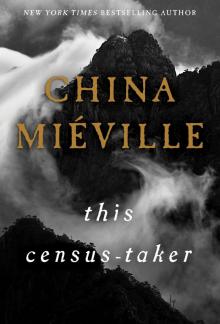 This Census-Taker
This Census-Taker Jack
Jack October: The Story of the Russian Revolution
October: The Story of the Russian Revolution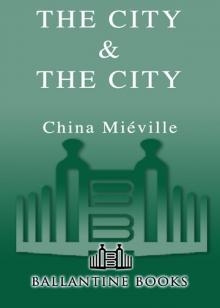 The City & the City
The City & the City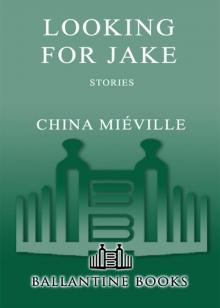 Looking for Jake: Stories
Looking for Jake: Stories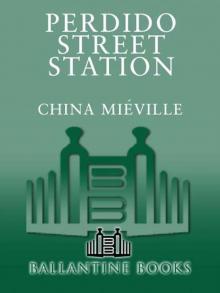 Perdido Street Station
Perdido Street Station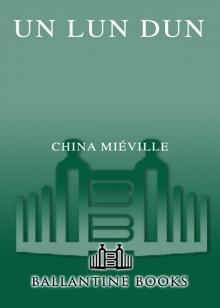 Un Lun Dun
Un Lun Dun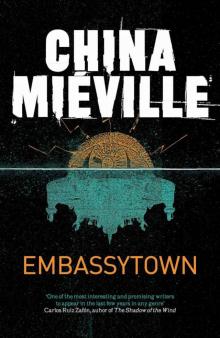 Embassytown
Embassytown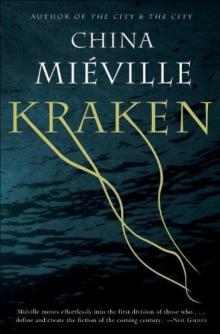 Kraken
Kraken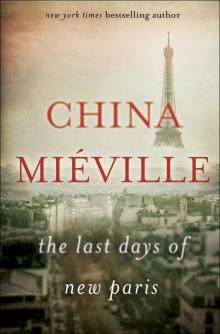 The Last Days of New Paris
The Last Days of New Paris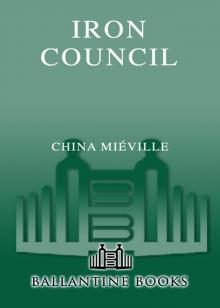 Iron Council
Iron Council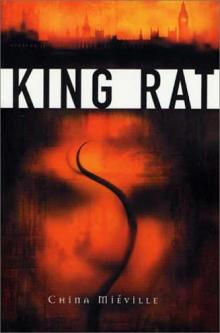 King Rat
King Rat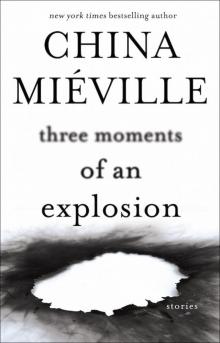 Three Moments of an Explosion
Three Moments of an Explosion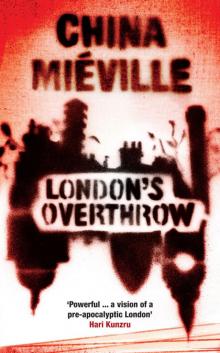 London's Overthrow
London's Overthrow October
October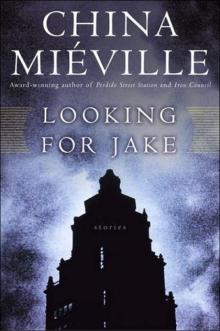 Jack (new crobuzon)
Jack (new crobuzon)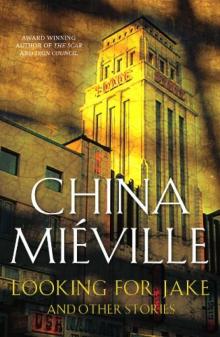 Looking for Jake and Other Stories
Looking for Jake and Other Stories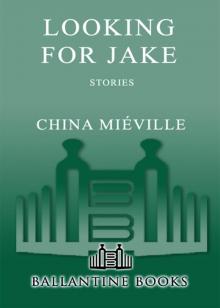 Looking for Jake
Looking for Jake